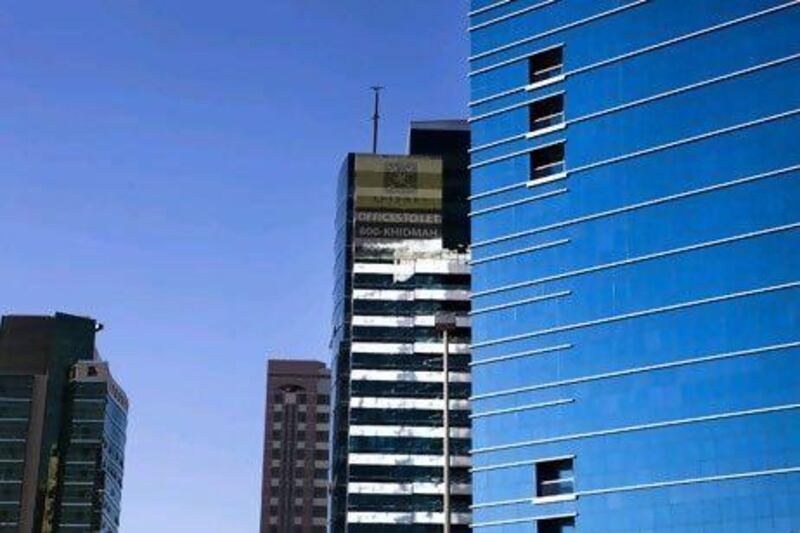Rents for office space in Abu Dhabi are expected to continue falling this year as new projects are completed, industry executives say.
Rates dropped 13 per cent in the fourth quarter of last year, according to data from CB Richard Ellis (CBRE). The average office rate in Abu Dhabi has fallen 62 per cent since the peak in the third quarter of 2008, from Dh4,750 (US$1,293) a square metre to Dh1,800 a sq metre, CBRE reports.
"We expect further downward pressure" on rents, said Matthew Green, the head of research for CBRE's UAE office. "A lot of the new projects we expected in 2010 will happen this year."
The capital's office supply, which stands at about 2.15 million sq metres, is forecast to grow by more than 50 per cent in the next two years. About 540,000 sq metres of space is due to come on to the market this year, including the 24-storey International Tower in Capital Center and Sowwah Square, part of the new Sowwah Island business district.
About 580,000 sq metres should be completed next year, according to CBRE estimates.
In addition to lower rents, many landlords are offering free rental periods and customisation deals to woo tenants - incentives unheard of in Abu Dhabi a few years ago, agents say.
But many landlords and tenants are waiting for new buildings to open before making moves, they say.
"There seems to be a stalemate at the moment," said Piers Barttelot, the head of agency in Abu Dhabi for Jones Lang LaSalle. "I think a lot of tenants want to upgrade, but the right buildings haven't come up at the right place."
The majority of tenants in Abu Dhabi are small companies or branch offices requiring less than 2,000 sq metres, Mr Barttelot said. They do not have a strong incentive to move until rents fall further or there is better-quality space available, he said.
There is still a shortage of high-quality office space, agents say. CBRE describes less than 20 per cent of the new space as "prime".
Rents in top office buildings, such as the towers in Sowwah Square, which should be finished later this year, are still closer to Dh2,200 a sq metre.
"If you have to take space immediately, rents are still high," said David Quinn, the head of UAE operations for the property broker Cushman & Wakefield.
But leasing agents expect a flurry of activity once the new buildings are on the market. Commercial tenants in Abu Dhabi typically have one-year leases, making it easier to quickly move when new space becomes available, agents say.
"The majority of demand is coming from occupiers who were unable find the required space in the past," Mr Quinn said.
Older buildings will find it difficult to compete, he said.
"A lot of older buildings will probably turn back into residential or be left vacant," he said.
Although the Abu Dhabi economy is expected to grow in the next few years, leasing agents expect to see fewer companies setting up large operations in the city. Dubai, which has a surplus of high-quality office space, still draws the bulk of international companies.
"I don't see how [Abu Dhabi], with limited demand, will manage to keep rents at a premium," Mr Barttelot said. "I think they will continue to slide for quite some time."
In 2008, Abu Dhabi was one of the five most expensive office markets in the world, rivalling Tokyo, Hong Kong and London, according to Cushman & Wakefield data. Now, it is about 33rd in the rankings, in line with Istanbul, Damascus and Warsaw.






